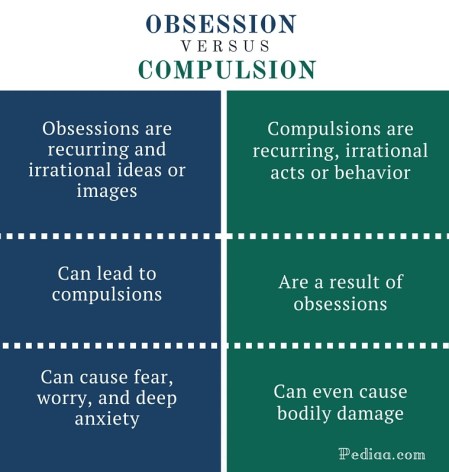Main Difference – Obsession vs Compulsion
Obsessions and compulsions are the two main symptoms of OCD (Obsessive Compulsive Disorder). OCD is a mental disorder where an individual is plagued by uncontrollable recurring thoughts and behaviors. Obsessions are the unwanted thoughts and ideas that preoccupy a person’s mind whereas compulsions are the repeated behaviors. This is the main difference between obsession and compulsion. These obsessions and compulsions can interfere in one’s daily life and reduce the quality of life. In this article, you can identify the behaviors and thoughts that are categorized as compulsions and obsessions.
This article covers,
1. What is an Obsession? Examples of Obsessive Thoughts and Behaviors
2. What is a Compulsion? Examples of Compulsive Thoughts and Behavior
3. Comparison and Key Differences Between Obsession and Compulsion

What is an Obsession
Obsessions are thoughts, ideas or images that continually preoccupy or intrude on a person’s mind. Obsessions are usually considered as irrational, but a person suffering from OCD may not be able to control or stop them. Recurrent thoughts about death, God, devil, diseases, etc. are some common obsessions. For example, a person may suffer from the irrational fear that he or someone close to him will die suddenly; this person will be plagued by constant worry and tension. Therefore, people with OCD also feel tension, anxiety, and fear along with obsession.
Some people will have mild obsessions that occur once in a while whereas some people will suffer from constant obsessive thoughts and ideas. Given below are some common obsessions:
Fear of becoming ill
Fear of germs
Fear of dirt
Worry that something has not been done right
Constant thoughts about sex
Aggressive thoughts about other people

What are Compulsions
Compulsions are recurring acts or behavior, which usually stems as a result of obsessions. For example, a person who has an irrational fear of germ and dirt will wash his hands repeatedly, even when his hands get red and raw from too much washing. This person’s behavior stems from his obsessive thoughts. Some common compulsions that result from obsessions include:
Brushing teeth repeatedly
Excessive cleaning
Arranging random objects in a systematic way
Checking whether the doors are locked
Checking whether the appliances are turned off
Some other people repeat certain acts or behavior to mitigate the anxiety that is caused by particular obsessive thoughts. Such behavior includes hair pulling, nail biting, self-biting, skin picking, etc.
Some individuals may be aware that this kind of repeated behavior is irrational and illogical, but they are compelled to behave in this way to avoid feelings of anxiety and fear.
People who suffer from OCD find it hard to control these obsessions and compulsions. They can interfere with an individual’s daily life, causing problems in personal and professional relationships.

Repeated washing hand is a compulsive behavior
Difference Between Obsession and Compulsion
Meaning
Obsessions are recurring and irrational thoughts, ideas or images.
Compulsions are recurring acts or behavior.
Interrelationship
Obsessions can lead to compulsions.
Compulsions are a result of obsessions.
Effect
Obsessions can cause fear, worry, and deep anxiety.
Compulsions can even cause bodily damage.
Both compulsions and obsessions cause disruptions in the day to day life a person as well.
Examples
Obsessions include fear of disease, germs, dirt, etc. and constant thoughts about death, demons, god, etc.
Compulsions include excessive cleaning, washing, hair pulling, self-biting, etc.
Image Courtesy:
“Mr Pipo thoughts” By © Nevit Dilmen (CC BY-SA 3.0) via Commons Wikimedia
“Cleaning hands” By Arlington County (CC BY-SA 2.0) via Commons Wikimedia
